Wednesday, December 6, 2023. Annette’s News Roundup.
I think the Roundup makes people feel not so alone.
To read an article excerpted in this Roundup, click on its blue title. Each “blue” article is hyperlinked so you can read the whole article.
Please feel free to share.
Invite at least one other person to subscribe today! https://buttondown.email/AnnettesNewsRoundup
______________________________
This issue of the Roundup is about rape. You may not want to read it.
Rape as a weapon of War.
Warning: The following posts may include graphic descriptions of sexual violence.
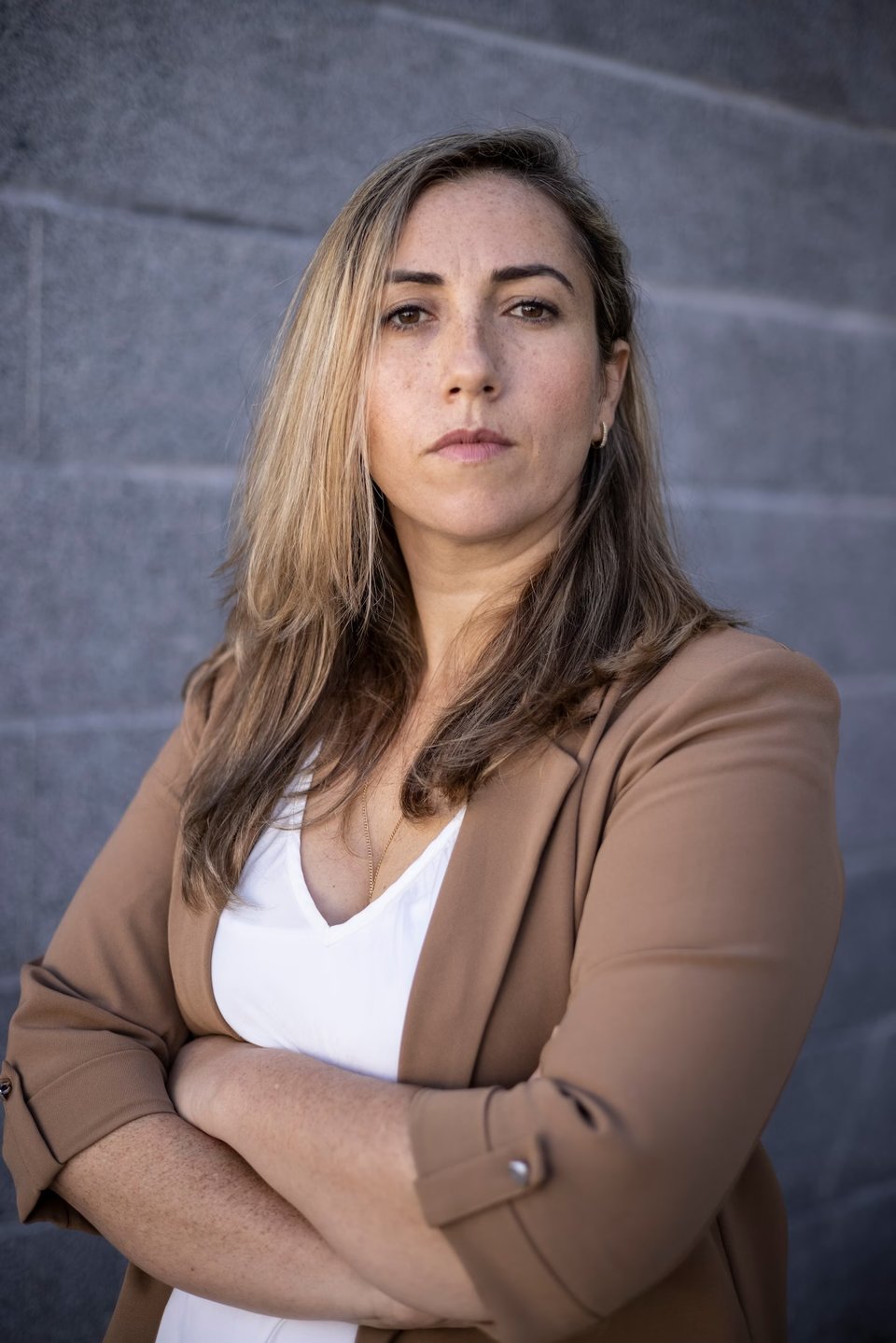
Cochav Elkayam-Levy leads the civil commission on Hamas crimes against women.
Israel investigates an elusive, horrific enemy: Rape as a weapon of war.
Warning: The following report includes graphic descriptions of sexual violence.
TEL AVIV — The first indications of possible sexual violence came as early as Oct. 7, the day that thousands of Hamas and other fighters streamed into Israeli towns and began live-streaming bloodshed and torture. Footage showed several women stripped of their clothing. One video showed a woman, her hands zip-tied behind her back, with blood on the crotch of her pants.
Later came testimony from witnesses and first responders. One witness described in graphic detail a gang rape at the Nova rave site near Re’im. An Israeli reserve combat paramedic told The Post that he found the bodies of teenage girls with signs of sexual assault. Combatants from Gaza overran 22 Israeli communities, killed at least 1,200 and took 240 hostage in the surprise attack. But their greater goal, sexual trauma specialists say, was to introduce terror against women — and children and other unarmed civilians — as a means of spreading fear.
“The torture of women was weaponized to destroy communities, to destroy a people, to destroy a nation,” said Cochav Elkayam Levy, the head of a nongovernmental commission investigating crimes perpetrated against women and children on Oct. 7. Hamas denies that its fighters use rape or assault against women as a weapon of war. To do so, Hamas official Basem Naim said, would go against its founding Islamic principles. The group, he said, considers “any sexual relationship or activity outside of marriage to be completely haram” — forbidden by Islam. “
Whoever does this kind of act is committing a major infraction and would be punished both legally and on Judgment Day,” he told The Washington Post. “So our soldiers would not go close to this forbidden” act.
Earlier this month, Moussa Abu Marzouk, deputy chairman of the Hamas Political Bureau based in Qatar, also said in an interview with the BBC that “women, children and civilians were exempt” from Hamas’s attacks — despite a death toll that was made up mostly of those groups.
The Israeli commission, established by Elkayam-Levy, is working to compile a comprehensive database of the assault that day, based on the testimonies of survivors, witnesses, medical examiners, first responders, police and militants themselves, many of whom participated first from behind the camera, as they recorded their actions, and later in front of the camera, as they were interrogated by Israeli security forces.
That’s in addition to the investigation by Israel’s police in coordination with the military and Shin Beit, the internal security service. The agencies have been building a case on charges of mass murder, rape, torture and bodily mutilation.
Authorities invited journalists this month to view a video compilation that drew from at least 60,000 clips and more than 1,000 witness statements. “There was humiliation through rape on the morning of Oct. 7,” Israeli Police Chief Kobi Shabtai said.
“There was worse evidence that we were not able to show,” he said. “They cut limbs and genitals, they raped, they abused corpses. There were sadistic sexual acts.” It’s unclear whether authorities have accounts directly from rape survivors. Israel has experience and training in mass casualty events, but never before on the scale of Oct. 7, the bloodiest day in the country’s history.
Israel is not a member of the International Criminal Court (ICC), and Israeli authorities have not said whether they intend to prosecute Hamas militants for war crimes. Prime Minister Benjamin Netanyahu has repeatedly condemned ICC investigations of war crimes allegedly perpetrated by Israeli and Palestinian forces in the occupied Palestinian territories.
Some forces in the Middle East, including those of Syrian President Bashar al-Assad and the Islamic State, have used systematic rape as a weapon. But many armed groups consider the act taboo, even in war. The practice has never been used systematically in the Israeli-Palestinian conflict, according to experts.
Naim, the Hamas official, said the group’s fighters “did not commit any infraction that related to harassment or rape.”
“We affirm that all these Israeli claims are inaccurate,” he said.
The mission to identify and document rape and gender-based violence has been a grass-roots effort, focusing on providing care to witnesses and survivors while also recognizing what specialists say is the possibility that most or all of the victims were killed.
The country’s several dozen sexual trauma specialists have been meeting with female survivors of Oct. 7 in clinics or in the hotels where the women are long-term guests, unable to return to damaged or destroyed homes in what is now a designated military zone.
The specialists have been hosting webinars, studying rape as a weapon of war in places such as Ukraine or Bosnia and communicating with other professionals in the field. They are sharing information on things like eye movement desensitization and reprocessing, prolonged exposure therapy and cognitive behavioral therapy (CBT) to help women begin to take control over traumatic memories, created under fire and likely processed erratically in the following weeks, as the war raged on and hostages, including survivors’ loved ones, remained in captivity in Gaza.
The specialists advise against asking a person whether they were raped. Instead, it’s important to let them know that they’re not alone. One might say: “There have been reports of sexual violence. Is it possible you know something about it?”
“You throw out a thread and see if they take it,” said sexual trauma clinic director Inbal Brenner, the assistant director of Lev-Hasharon Mental Health Center in central Israel. Mental health care providers, many of whom were traumatized, too, are grappling with the challenges of Oct. 7, which compounded sexual violence with a kind of namelessness, she said.
“There’s always dehumanization in rape,” she said. “But here it’s also nationalistic, which is very difficult to measure.
” The commission isn’t necessarily encouraging survivors to report their assaults to police. Telling the facts of their experiences to investigators in offices for the record could clash with the primary goal of returning a sense of control or a sense of self.
One woman, her face blurred and her identity concealed in a video statement to police, said she saw a gang rape at the Nova rave near Re’im during the Oct. 7 attack, as she lay down, pretending to be dead. The witness saw a woman bleeding from the back, she said, first bent over, then pulled back up by combatants. One man pulled the woman’s long hair and raped her, the witness said, then passed her onto another man, who also raped her before shooting her in the head. “He didn’t pick up his pants,” the witness said. “He shot her while inside her.”
Survivors and witnesses have been reluctant to come forward, specialists say. “There is always underreporting in sexual violence,” said Orit Sulitzeanu, who runs the Association of Rape Crisis Centers, based in Tel Aviv. “But with war crimes we know there will be extreme underreporting.” Under those conditions, first responders and morgue workers have become a key source of information. “We saw many women with bloody underwear, with broken bones, broken legs, broken pelvises,” said Shari, a volunteer worker at the Shura military morgue. She spoke on the condition that her last name be withheld to discuss the sensitive issue.
An Israeli reserve combat paramedic who spoke on the condition of anonymity to comply with military protocol told The Post that he found the bodies of two teenage girls in their bedroom with indications of sexual assault.
“One was on the bed. Her arm was dangling from the bed frame. Her legs were bare, with bruises, and she had a bullet hole in the chest-neck area,” he said. “The other was lying on the floor, on her stomach, her legs spread and her pants pulled down toward her knees. There was a liquid on her back that looked like semen. She was shot in the back of the head.”
Devorah Bauman, a gynecologist, said women sometimes provide testimony indirectly — saying, for example, “that they heard there was rape in a neighbor’s house, or that there was an adolescent who was raped in front of her grandmother, in a nearby house. They are speaking indirectly, but I am not sure that it didn’t happen to them.”
Bauman is director of the Bet Ami Center, which treats rape survivors at Hadassah Hospital in Jerusalem. She’s helping to prepare hospitals to receive women and possibly men if and when they come forward. They could include hostages now held in Gaza by Hamas and other groups. Ninety of the approximately 240 hostages taken from Israel on Oct. 7 are women or girls. Kinneret Stern’s cousin sold jewelry at the Nova rave, and was among the people kidnapped. As the family searched for her, they were shown a video of the woman, posted apparently by her captors, in a ditch and begging for her life.
“This is one of the Jewish dogs,” a man says. “Any man here will see what we will do to her, and we are here in the field.”
The “video implies the nightmare that every woman is afraid of, of not being able to defend her own body,” Stern said. “It’s an issue that we dare not even say out loud.”
(Washington Post).
Sheryl Sandberg Calls for More Outrage Over Attacks on Women on October 7th.
Sheryl Sandberg, the high profile former Meta executive, spoke alongside Senator Kirsten Gillibrand and several Israeli officials at an event designed to highlight the atrocities committed against women by Hamas during its attacks on Israel on Oct. 7, and to scold the international community for its silence on the issue. Former Secretary of State Hillary Clinton also weighed in by video.
“Rape should never be used as an act of war,” said Sandberg. “This truth must be upheld despite the politics of our time. Because no matter what marches you're attending, what flag you are flying, what religion you practice, or if you practice none at all, here's one thing we can all agree on: there are exactly no circumstances that justify rape.” Sandberg also aired her views in a video and wrote a column on the subject.
The gathering, which was presented by Israel’s Permanent Mission to the U.N., brought together eyewitness accounts from first responders, those who had gathered and tended to the bodies of female victims after the Oct. 7 attacks, and advocates for women and for Israel—who scolded women’s organizations, and in particular UN Women, for not condemning the actions of Hamas more forcefully. (The organization released a statement “unequivocally condemn[ing] the brutal attacks by Hamas” on Dec. 1.) “Only two days ago, nearly two months after Hamas’s massacre, has UN Women showed an ounce of recognition,” said Gilad Erdan, Israel's ambassador to the United Nations.
Organizers showed video confessions of captured Hamas militants attesting to what they had seen, including rape and the violation of female corpses. Members of the Israeli Police Force and others who had dealt with bodies testified at the event as well. Shari Mendes, an American-born architect and Israel Defense Force reservist had the responsibility of preparing female soldiers’ bodies for burial. “Many young women arrived in bloody shredded rags or just in underwear and their underwear was often very bloody,” she said. “Our team commander saw several female soldiers who were shot in the crotch, intimate parts, vagina or shot in the breast.” A first responder, Simcha Grainimin, a volunteer with Israeli search and rescue operation ZAKA, testified, with difficulty, that he found a woman’s body with nails, and other objects, in her vaginal cavity.
Hamas has denied that any rape took place on Oct. 7.
(Touch to Watch👇)
I agree with @sherylsandberg:
— Hillary Clinton (@HillaryClinton) November 21, 2023
Rape is never acceptable. pic.twitter.com/SAaaRXaAG2
Some speakers at the event, including Clinton, made efforts to appear neutral on the war. “I have grieved with Israeli women who have lost loved ones to terrorist attacks, but refused to believe that peace is impossible,” the former First Lady said. “I have talked and listened to Palestinian women who have suffered greatly from the conflicts of the past decades, yet dream of a peaceful future and a state of their own.” (Time).
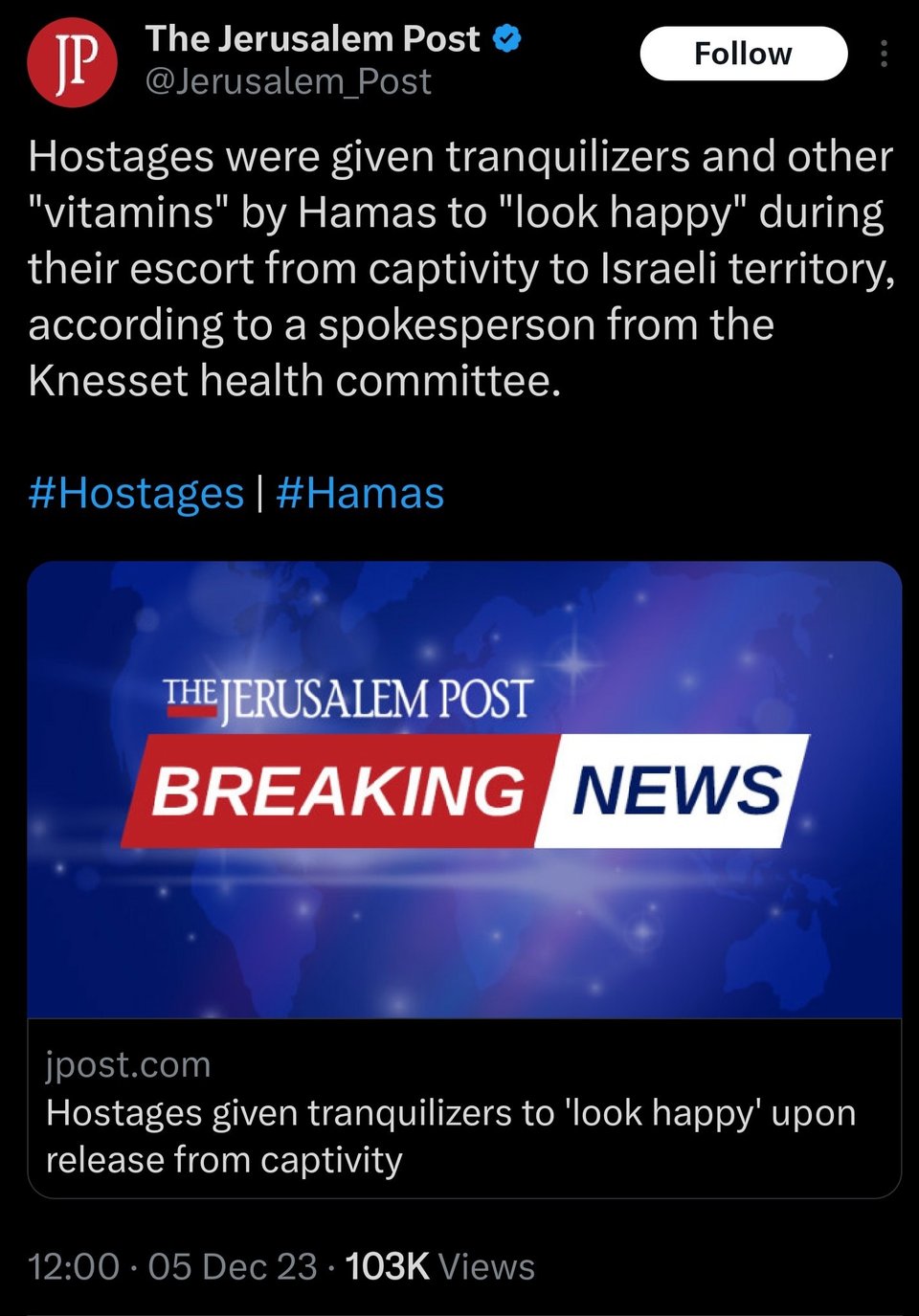
Hamas may not want to release women to keep them from talking, U.S. official says.
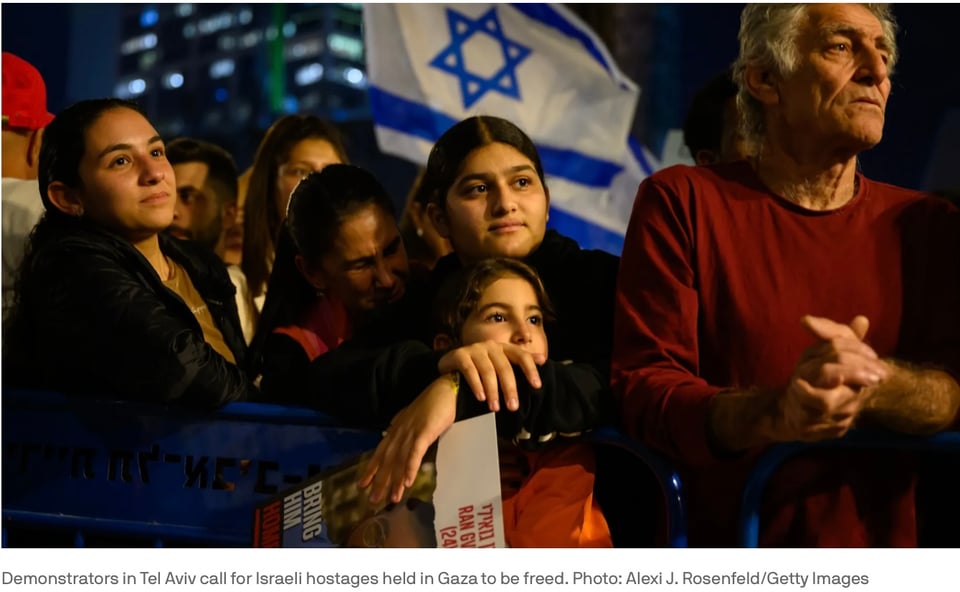
State Department spokesman Matthew Miller said Monday "it seems" Hamas has refused to release all of the Israeli women it is holding hostage in Gaza because the terror group doesn't want them to tell what they have gone through in captivity.
Why it matters: Miller did not provide any evidence to back up his claim, but it's the first time a senior U.S. official has raised the possibility that Hamas has harmed some of the women it's holding hostage.
Miller suggested that Hamas' reluctance to release the women in exchange for a continued pause in Israel's counter-attack on the terror group was a reason negotiations for more hostage releases broke down.
"It seems that one of the reasons they don't want to turn women over that they've been holding hostage — and the reason this pause fell apart — is that they don't want these women to be able to talk about what happened to them during their time in custody," Miller said in the daily State Department press briefing.
Miller said, however, that he is not able to speak "with a definitive assessment that that is the case." He added the U.S. wants the women released "so that they could talk about any treatment or mistreatment they got."
Zoom in: Miller's comments are in line with what two senior Israeli defense and intelligence officials have told Axios about Israel's assessment of Hamas' reluctance to release the women.
Israeli officials believe there are about 18 women who are still in Hamas' custody, most of them taken captive when Hamas militants raided a music festival near Israel's border with Gaza. The officials believe some of the women have been killed, and that others are held hostage.
To date, Hamas has released nearly four dozen women it had held since the group's deadly Oct. 7 attack on Israel.
Driving the news: The negotiations over extending a ceasefire in Gaza collapsedFriday, after Hamas refused to release the rest of the Israeli women it is holding and asked to discuss releasing elderly men instead.
White House National Security Adviser Jake Sullivan said Monday that Israel refuses to give up on the women Hamas is holding, and demands their release before discussing other categories of hostages.
"The way back to negotiations is for Hamas to do its part of the deal," Sullivan said during a White House briefing. He did not comment on why Hamas might not want to release the women.
The big picture: Since Oct. 7, Israeli police and civil society organizations have collected evidence and testimonies of sexual assault and rape of women by Hamas operatives during the attack on Israel.
Last week UN Women, the UN's women's rights organization, issued a statement expressing concern of possible sexual crimes against Israeli women by Hamas and called for an investigation.
Monday at the UN headquarters in New York, an Israeli police investigator revealed video testimonies of survivors of the attack on music festival. One witness on the video said she saw several Hamas operatives raping an Israeli woman.(Axios).
CNN’s Dana Bash has tense exchange over Hamas rapes with Representative Pramila Jayapal.

CNN anchor Dana Bash pressed Rep. Pramila Jayapal (D-Wash.) on the silence from some fellow progressive leaders on Hamas’s use of rape as a weapon of war against Israeli women, in a tense exchange in a Sunday interview.
“It is kind of remarkable that this issue hasn’t gotten enough attention globally, widespread use of rape, brutal rape, sexual violence against Israeli women by Hamas,” Bash said.
“I have seen a lot of progressive women, generally speaking, that are quick to defend women’s rights and speak out against using rape as a weapon of war, but downright silent on what we saw on Oct. 7 and what might be happening inside Gaza right now to these hostages. Why is that?” Bash continued.
Jayapal contested the premise.
“I mean, I don’t know that that’s true. I think what — we always talk about the impact of war on women, in particular. In fact, I remember, 20 years ago, I did a petition around the war in Iraq, saying that …”
Bash cut in, asking whether Jayapal has talked about it since Oct. 7, when the U.S.-designated terrorist organization Hamas launched a surprise attack on Israel’s southern border, killing 1,200 Israelis and taking more than 240 hostages.
“Oh, absolutely. And I have condemned what Hamas has done. I have condemned all of the actions.” Jayapal said.
“Specifically against women?” Bash asked.
“Absolutely, the rape, the — of course,” Jayapal answered, before pivoting her answer to focus on Israel, noting it is a democracy and is held to a higher standard “if they do not comply with international law.”
“And, frankly, morally, I think we cannot say that one war crime deserves another. That is not what international humanitarian law says,” Jayapal added.
Bash pointedly noted Jayapal’s diversion.
“OK, with respect, I was just asking about the women, and you turned it back to Israel. I’m asking you about Hamas,” Bash said.
“I already answered your question, Dana. I said it’s horrific,” Jayapal said. “And I think that rape is horrific. Sexual assault is horrific. I think that it happens in war situations. Terrorist organizations like Hamas obviously are using these as tools.”
“However, I think we have to be balanced about bringing in the outrages against Palestinians,” she continued, adding, “Fifteen thousand Palestinians have been killed in Israeli airstrikes, three-quarters of whom are women and children.”
Bash responded directly: “And it’s horrible, but you don’t see Israeli soldiers raping Palestinian women.”
“Well, Dana, I think we’re not — we’re not — I don’t want this to be the hierarchy of oppressions,” Jayapal said.
The Hill has reached out to Jayapal’s office for additional comment.
The condemnation of Hamas for sexual violence during its rein of terror on Israel has also become a flashpoint for tensions in the United Nations.
More than 80 House lawmakers accused United Nations (UN) Women of disregarding the militant group Hamas’s attacks on women specifically in a bipartisan letter last week.
“The failure by UN Women to publicly stand up for Israeli women and condemn Hamas’ systematic atrocities undermines UN Women and highlights its one-sided approach,” the lawmakers wrote Wednesday to UN Women Executive Director Sima Bahous. (The Hill).
The UN Women issued a statement on Rape on December 1. Very many (see sample comments is article above) think that was too late… 57 days after the attack by Hamas.
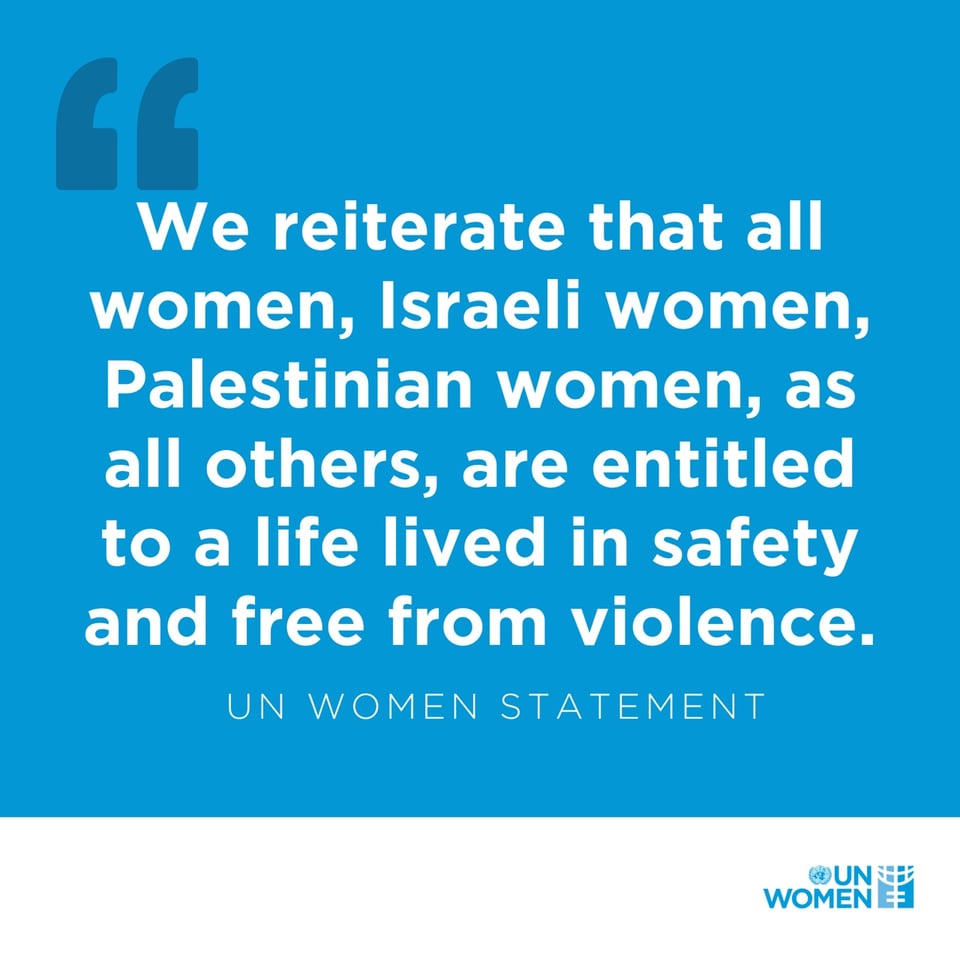
Israel Gaza: Hamas raped and mutilated women on 7 October, BBC hears.
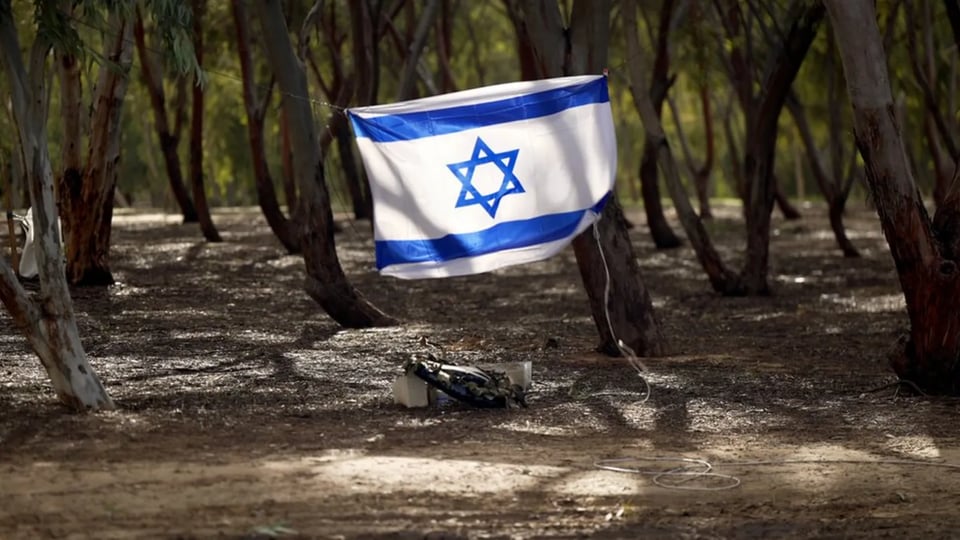
Israelis are still grappling with the Hamas attack in October.
The BBC has seen and heard evidence of rape, sexual violence and mutilation of women during the 7 October Hamas attacks.
Several people involved in collecting and identifying the bodies of those killed in the attack told us they had seen multiple signs of sexual assault, including broken pelvises, bruises, cuts and tears, and that the victims ranged from children and teenagers to pensioners.
Video testimony of an eyewitness at the Nova music festival, shown to journalists by Israeli police, detailed the gang rape, mutilation and execution of one victim.
Videos of naked and bloodied women filmed by Hamas on the day of the attack, and photographs of bodies taken at the sites afterwards, suggest that women were sexually targeted by their attackers.
Few victims are thought to have survived to tell their own stories.
Their last moments are being pieced together from survivors, body-collectors, morgue staff and footage from the attack sites.
WARNING: CONTAINS EXTREMELY GRAPHIC DESCRIPTIONS OF SEXUAL VIOLENCE AND RAPE.
Police have privately shown journalists a single horrific testimony that they filmed of a woman who was at the Nova festival site during the attack.
She describes seeing Hamas fighters gang rape a woman and mutilate her, before the last of her attackers shot her in the head as he continued to rape her.
In the video, the woman known as Witness S mimes the attackers picking up and passing the victim from one to another.
"She was alive," the witness says. "She was bleeding from her back."
She goes on to detail how the men cut off parts of the victim's body during the assault.
"They sliced her breast and threw it on the street," she says. "They were playing with it."
The victim was passed to another man in uniform, she continues.
"He penetrated her, and shot her in the head before he finished. He didn't even pick up his pants; he shoots and ejaculates."
One man we spoke to from the festival site said he heard the "noises and screams of people being murdered, raped, decapitated".
To our question about how he could be sure - without seeing it - that the screams he heard indicated sexual assault rather than other kinds of violence, he said he believed while listening at the time that it could only have been rape.
A statement he made through a support organisation describes it as "inhuman".
"Some women were raped before they were dead, some raped while injured, and some were already dead when the terrorists raped their lifeless bodies," his statement says. "I desperately wanted to help, but there was nothing I could do."
Police say they have "multiple" eye-witness accounts of sexual assault, but wouldn't give any more clarification on how many. When we spoke to them, they hadn't yet interviewed any surviving victims.
Israel's Women's Empowerment Minister, May Golan, told the BBC that a few victims of rape or sexual assault had survived the attacks, and that they were all currently receiving psychiatric treatment.
"But very, very few. The majority were brutally murdered," she said. "They aren't able to talk - not with me, and not to anyone from the government [or] from the media."
Videos filmed by Hamas include footage of one woman, handcuffed and taken hostage with cuts to her arms and a large patch of blood staining the seat of her trousers.
In others, women carried away by the fighters appear to be naked or semi-clothed.
Multiple photographs from the sites after the attack show the bodies of women naked from the waist down, or with their underwear ripped to one side, legs splayed, with signs of trauma to their genitals and legs.
"It really feels like Hamas learned how to weaponise women's bodies from ISIS [the Islamic State group] in Iraq, from cases in Bosnia," said Dr Cochav Elkayam-Levy, a legal expert at the Davis Institute of International Relations at Hebrew University.
"It brings me chills just to know the details that they knew about what to do to women: cut their organs, mutilate their genitals, rape. It's horrifying to know this."
"I spoke with at least three girls who are now hospitalised for a very hard psychiatric situation because of the rapes they watched," Minister May Golan told me. "They pretended to be dead and they watched it, and heard everything. And they can't deal with it."
Israel's police chief Yaacov Shabtai said that many survivors of the attacks were finding it difficult to talk and that he thought some of them would never testify about what they saw or experienced.
"18 young men and women have been hospitalised in mental health hospitals because they could no longer function," he said.
Others are reportedly suicidal. One of those working with the teams around survivors told the BBC that some had already killed themselves.
Much of the evidence has come from the volunteer body-collectors deployed after the attacks, and those who handled the bodies once they arrived at the Shura army base for identification.
One of the body-collectors volunteering with the religious organisation Zaka described to me signs of torture and mutilation which included, he said, a pregnant woman whose womb had been ripped open before she was killed, and her foetus stabbed while it was inside her.
Another, Nachman Dyksztejna, provided written testimony of seeing the bodies of two women in kibbutz Be'eri with their hands and legs tied to a bed.
"One was sexually terrorised with a knife stuck in her vagina and all her internal organs removed," his statement says.
At the festival site, he says small shelters were "filled with piles of women. Their clothing was torn on the upper part, but their bottoms were completely naked. Piles and piles of women. […] When you took a closer look at their heads, you saw a single shot straight to the brain of each."
Hundreds of bodies were collected from the attack sites by volunteers.
Investigators admit that in those first chaotic days after the attacks, with some areas still active combat zones, opportunities to carefully document the crime scenes, or take forensic evidence, were limited or missed.
"For the first five days, we still had terrorists on the ground in Israel," May Golan said. "And there were hundreds, hundreds of bodies everywhere. They were burned, they were without organs, they were butchered completely."
"This was a mass casualty event," police spokesman Dean Elsdunne told journalists at a briefing.
The first thing was to work on identifying the victims, not necessarily on crime scene investigation. People were waiting to hear what happened to their loved ones."
It was staff at the army's Shura base, where bodies arrived for identification, who have provided investigators with some of the most crucial evidence.
This evidence emerged from a makeshift hub of tents and refrigerated shipping containers set up at the base to identify the bodies.
When we visited, hospital trolleys, their iron skeletons topped with khaki stretchers, stood neatly lined up in front of the containers that housed the dead; the white plastic overalls of those on shift translucent under the floodlights.
Fighter jets roared overhead, drowning out the cicadas, as Israel's bombardment of Gaza continued.
Teams here told us they'd seen clear evidence of rape and sexual violence on the bodies coming in, including broken pelvises from sustained violent abuse.
"We see women of all ages," one of the reservists on the forensic team, Captain Maayan, told the BBC. "We see rape victims. We see women who have been through violation. We have pathologists and we see the bruises, we learn about the cuts and tears, and we know they have been sexually abused."
I ask her what proportion of the bodies she's handled show signs of this.
"Abundant," she said. "Abundant amount of women and girls of all ages."
The number of victims is hard to define, partly because of the state of the bodies.
"It's definitely multiple," said another serving soldier who asked use to use only her first name, Avigayil. "It's hard to tell. I've dealt with more than a few burned bodies and I have no idea what they went through beforehand. And bodies that are missing the bottom half - I also don't know if they were raped. But women that were clearly raped? There are enough. More than enough."
"Sometimes we are left only with a very small part of the body," Dr Elkayam-Levy tells me. "Maybe it's a finger, a foot or a hand that they're trying to identify. People were burned to ashes. Nothing was left. […] I want to say that we'll never know how many cases there were."
Privately some of those working on this talk in terms of "dozens" of victims but quickly caution that evidence is still being gathered and pieced together.
The civil commission headed by Dr Elkayam-Levy, to collect testimony on sexual crimes, is calling for international recognition that what happened on 7 October was systematic abuse, constituting Crimes Against Humanity.
We see definite patterns," she told me. "So it wasn't incidental, it wasn't random. They came with a clear order. It was […] rape as genocide."
Avigayil agrees there were similarities in the violence visited on the bodies that arrived at the Shura base.
"There are patterns in that groups of women from the same place were treated in a similar manner," she said.
"There might be a set of women who were raped in one way, and we're seeing similarities in the bodies; and then a different set that were not raped but shot multiple times in the exact same pattern. So it seems that different groups of terrorists had different forms of cruelty."
"This was a premeditative, systematic event," police chief Yaacov Shabtai told journalists.
Dr Elkayam-Levy said before the statement that international women's rights organisations had taken far too long to respond to her call for support.
"This is the most documented atrocity humanity has known," she told me.
"Israel on 7 October is not the same country that woke up the following morning," said police chief Yaacov Shabtai.
Amid the horror of what happened to women here, Captain Maayan from the Shura identification unit says the hardest moments are when she sees "the mascara on their eyelashes, or the earrings they put on that morning".
I ask where that lands in her, as a woman.
"Terror," she replied. "It terrorises us." (BBC, I have chosen not to put photos in this post).
Biden says Hamas raped, mutilated women during Israel assault.
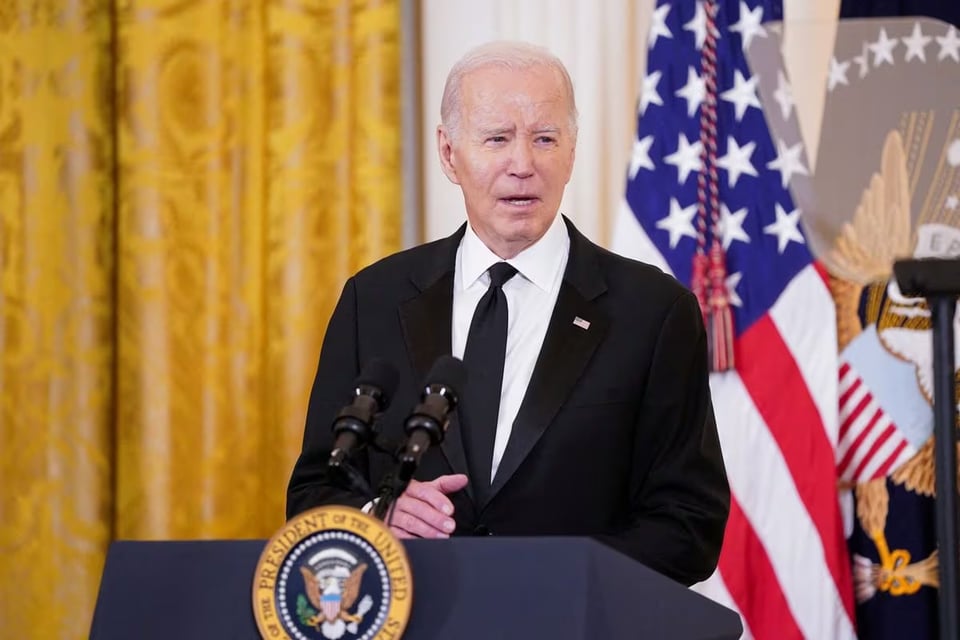
BOSTON, Dec 5 (Reuters) - U.S. President Joe Biden said on Tuesday that Hamas had repeatedly raped women and mutilated their bodies during its Oct.7 assault on southern Israel, citing survivors and witnesses of the attacks.
Speaking at a political fundraiser in Boston, Biden said accounts of "unimaginable cruelty" had been shared over the past few weeks.
"Reports of women raped — repeatedly raped — and their bodies being mutilated while still alive, of women's corpses being desecrated, Hamas terrorists inflicting as much pain and suffering on women and girls as possible and then murdering them. It is appalling," Biden said.
The president called on international organizations, civil society and individuals to condemn sexual violence "without exception."
Israeli police are investigating possible sexual crimes by some of the few hundred people that they arrested after the Oct. 7 attack. Israel's justice ministry has said "victims were tortured, physically abused, raped, burned alive, and dismembered."
In a statement on its Telegram channel, Hamas said it denounced Biden's "attempt to falsely accuse" its fighters of committing sexual violence and rape on Oct. 7.
The Islamist group said Biden was joining Israel's effort to cover up war crimes in Gaza committed with U.S. support and to mislead public opinion.
Israel held an event at the United Nations in New York on Monday focused on sexual violence against women during the Oct. 7 attack. Israel has been critical of the world body's response to the attacks.
"As a global community we must respond to weaponized sexual violence, wherever it happens, with absolute condemnation. There can be no justification and no excuses. Rape as a weapon of war is a crime against humanity," former U.S. Secretary of State Hillary Clinton told the event in a pre-recorded video.
On Tuesday, Biden blamed Hamas for the collapse of a truce last week that had halted Israel's retaliatory military campaign against Gaza, saying the militant group's "refusal to release the remaining young women is what broke this deal".
Israel and Hamas have accused each other of wrecking negotiations to extend the week-long pause in fighting, which resumed on Dec. 1.
Since then, Israeli forces have expanded their ground operations on Hamas-run Gaza and stormed its main southern city. Gaza health officials say 16,248 people have been killed in Israel's attacks.
Hamas fighters who rampaged through Israeli towns on Oct. 7 killed 1,200 people and seized 240 hostages, according to Israel's tally. More than 100 hostages were freed during the truce.
During the fundraiser, Biden said: "Everyone still being held hostage by Hamas need to be returned to their families immediately. We're not going to stop." (Reuters).
______________________________